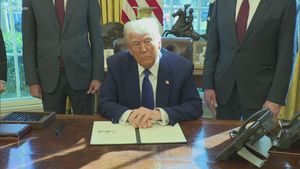The inflation rate in Brazil has seen significant acceleration, as the recently published IPCA-15 (Índice de Preços ao Consumidor Amplo 15) reveals. According to data released by the Instituto Brasileiro de Geografia e Estatística (IBGE) on Tuesday, February 25, the inflation measurement reached 1.23% for the month of February. This marks the highest rate recorded for February since 2016, when it was 1.42%.
The latest figure indicates a steep increase of 1.12 percentage points compared to January of this year. This upward trend is of concern, especially as it signals alterations affecting consumer purchasing behavior.
The IBGE's results show the urgency of addressing inflationary pressures, especially as they can directly influence households across the country. Economists and government officials are closely analyzing the factors driving this inflation spike, particularly as we near economic recovery post-pandemic.
The last time Brazil experienced such high inflation rates for February was six years ago, and economic analysts suggest monitoring the situation closely will be key to stabilize the financial environment. The increase has prompted discussions among policymakers about potential measures to curb the inflation.
This recent surge echoes patterns seen since April 2022, when inflation figures had begun to fluctuate drastically, compounding the challenges facing consumers. Prices are significantly impacted by various sectors, including food and energy, resulting in increasing costs for staple goods.
The Brazilian economic situation may call for strategic adjustments within fiscal policies, aimed at providing support to vulnerable populations affected by the rising costs of living. The government is facing pressure to balance its budgetary measures, which could involve tighter spending or even emergency strategies to handle inflation.
Some experts have suggested directly addressing the root causes of rising prices through targeted subsidies or direct assistance to specific industries, particularly those hard-hit during the pandemic. Such moves could cushion the effects on the most affected demographics.
On the institutional side, the Bank of Brazil’s monetary policy is under scrutiny as the central bank might have to reevaluate its interest rates strategy, with potential hikes looming on the horizon to combat inflation.
Public sentiment is understandably worried, with the resurgence of inflation leading consumers to adjust their weekly budgets and rethink spending on non-essential purchases. For many families, the inflationary period feels like retracing steps backward at what is supposed to be a time of growth.
Governments, experts, and the public need to remain vigilant as the economic assessments continue, particularly to see how aggressive or restrained the measures taken will be to deal with these numbers. Whatever the outcome, the ability to navigate these turbulent waters will define Brazil's economic resilience and the administration’s approach moving forward. The upcoming weeks will be telling as authorities deliberate over the necessary course of action.
This rise of inflation is not only about numbers but also reflects the broader economic sentiments and participants' confidence within Brazil's financial ecosystem.



